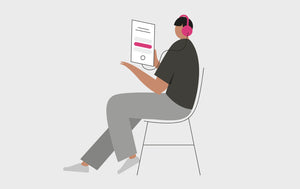What you need to know about Itchy Ears
Itchy ears can be a general and ongoing, daily annoyance. Whether it be itchy ears from hearing aids, wax or blockage, then you are not alone. In this article, we share some considerations of what causes itchy ears, what you can do about it, and when it is time to consult a medical professional.
What Causes Itchy Ears?
Itchy ears can be the result of many things, not just wearing hearing aids.
6 reasons why you may have itchy ears:
1. Skin problems
Eczema, psoriasis or dermatitis can flare up as a result of using a hearing aid and can be treated in the same way as other parts of your body. You may need to visit your doctor for treatment. As for non-hearing aid wears, these conditions can also flare up at any given time throughout the course of your life and have the same effect.
2. Trapped moisture
Itchy ears may be the result of moisture stuck in your hearing aid. In the heat, sweat can develop around your device, which for some can lead to residual irritation. It's important therefore that you keep the external ear free of water wherever possible. Furthermore, trapped fluids in the ear canal can also lead to extra touching which could cause more discomfort.
See our post: 7 Quick Tips for Drying your Ear Canal before inserting your Hearing Aid
3. A badly fitted hearing aid
A device that is not properly suited or fitted in your ear can cause the body to reject it, leading to inflammation and itchy ears. By simply changing the ear mould to one with a better fit, the problem may be solved. Contact our team of audiologists for advice on hearing aid fitting.
4. Dry ears
Sometimes the ear doesn't produce natural oils in sufficient abundance. Ear wax has an important job; it keeps the delicate skin within the ear canal healthy and supple so it doesn't dry out. Excessive cleaning of this area or lack of ear wax can lead to dry skin that flakes and itches.
5. General Irritation
If you are new to wearing a hearing aid, the itches may just be temporary. After all, you are introducing something foreign to a very delicate part of your ear.
6. An allergic reaction
The material encasing the hearing aid is possibly unideal to some. Although rigorous testing takes place, some people may still react to the plastic surround of the hearing aid or the polish that covers it. If this is the case, it is possible to remove the polish or change the plastic ear mould.
What Can Be Done About Itchy Ears?
Ultimately, this will depend on whether or not you actually wear a hearing aid.
Hearing Aid Wearers:
- Keep your device free from moisture where possible.
- Ensure your hearing aid is appropriately fitted.
- Invest in domes for added comfort.
Non-Hearing Aid Wearers:
- Avoid excessive cleaning of the ear canal, as this strips the ear of natural oils that help protect it and can inflame the area (several drops of olive oil every other day can keep the skin from drying out).
- Unblock ears properly with the appropriate tools should you have an excessive build-up of wax. E.g. Audiclean Cleansing Ear Wash
Alternatively, we supply a cream known as Eargene Skin Relief, which tackles itchy ears.
It alleviates a number of things:
- It soothes irritated and itchy skin
- Softens residual ear wax
- Encourages the rejuvenation of skin within your ear canal
- Softens stress cracks and any calcified tissue within the ear
- It's easily absorbed after application, leaving no residue
Particularly useful for those who wear hearing aids for protracted periods of time, Eargene Skin Relief is one of the only creams on the market designed specifically for itchy ears.
When To Consult Professionals...
If itchy ears become a real concern, even more so with known skin conditions, we advise that you seek guidance from a pharmacist or your GP. They will be able to help identify what is really going on and how to treat it. If the cause is a direct result of your hearing aid. you may have to get in touch with its manufacturer for best recommendations on how to improve your devices fit.
See Also
5 Reasons You May Have Muffled Hearing
Why Can't I Hear out of One Ear
How to Get Rid of Earwax at Home
About Hearing Direct
We are one of the world's leading hearing aid specialists. HearingDirect offers a wide range of affordable products, and information resources to help improve the quality of life for the hard of hearing. We sell:- Hearing aids,
- Batteries,
- Accessories such as earplugs,
- and amplified devices such as super loud alarm clocks and amplified phones.
Don't forget to like our Facebook Page
Author: Joan McKechnie

After qualifying as a Speech-Language Pathologist and Audiologist Joan has spent most of her 20 year career in hearing-care related roles. She has a wealth of experience within the hearing aid and hearing rehabilitation fields and has worked in manufacturing environments with two hearing aid companies helping to develop products and roll out new technologies. Joan has been involved with Hearing Direct since its launch and enjoys the online retail environment which seeks to provide easier access to hearing products and accessories. She is HCPC registered. Read Joan's full bio here.


